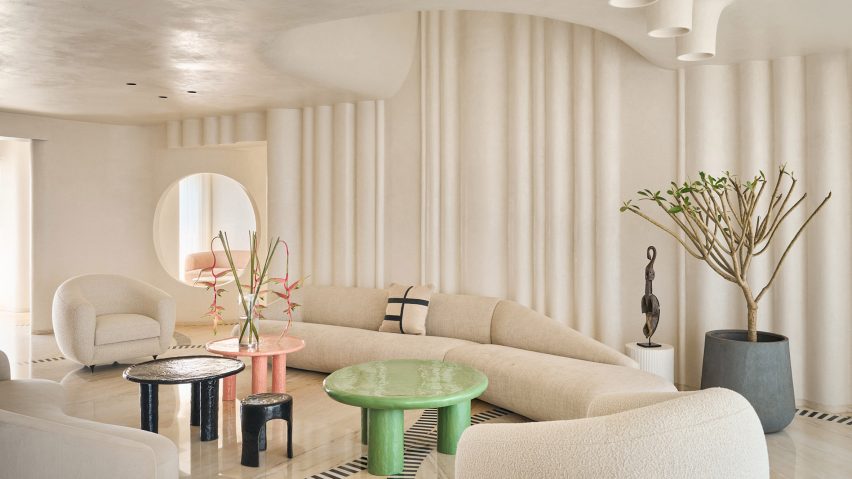Indian practice FADD Studio has fused two separate apartments inside a high-rise development in Bangalore to create a multigenerational family home.
The neighbouring four-bedroom apartments, stacked one on top of the other in the SNN Clermont residential tower, were transformed into a six-bedroom duplex for a cosmopolitan couple, their parents and two young children.
FADD Studio's interventions were driven by the owners' desire for something new and unique.
"Our clients wanted this home to be contemporary and free of the fuss of their previous home, which was more old-fashioned with traditional elements from the previous generation," the studio told Dezeen.
"They didn't want a run-of-the-mill place that looked like any other home with straight lines and contemporary anonymity. They wanted character and they were open to exploring the language of curves and most certainly wanted something out of the box."
The practice gave careful thought to how best to open up and link the two apartments before deciding on two connection points – a staircase near the entrance on the lower level and a double-height section in the adjacent living area for visual interest and ease of communication between family members.
Knowing the clients wanted to avoid straight lines, FADD Studio carefully considered the form of these linking elements.
"We began our usual process of looking to nature for inspiration, from shell exoskeletons to caterpillar curvatures, from topographical maps of different landscapes to fish scales and from sand dunes to waves," the practice said.
This research formed the basis for the curving statement staircase that sweeps into the living area.
"It has a sculptural feel with the addition of multiple curves, carved into each riser's deep red marble," the studio said.
The narrow double-height section in the living room is framed by an arched cutout in the ceiling, enveloped in white micro-cement with a soft sheen finish.
Linking the two levels, the double-height back wall is fluted in an irregular pattern, mimicking the soft ripples and waves that can be found across the ceiling in the neighbouring entrance hall.
"It hides all the conducting and allows a smooth transition between the different ceiling heights within the apartment," FADD Studio said.
The firm's approach to the flooring was similarly inventive. In the main living space, a "zebra border" of black-and-white stones swoops and crisscrosses in seemingly abstract patterns across the floor, helping to bring definition to the different zones.
The spaces in between are filled by a selection of heavily-veined peach-pink marbles.
"We created an inlay pattern much like repeating fish scales or groups of overlapping wild mushrooms but more abstract," said FADD Studio.
In the upstairs living room, the furniture is grouped around a central circle of linear-veined marble surrounded, which is inlaid into the floor and surrounded by another black-and-white border.
"The flooring is dramatic, something bold and thoughtful, contributing to the strong visual and spatial language of the space," the studio said.
"The ceilings and floor defy the mundane and give us and the apartment's inhabitants pure joy to see the lines and curves continue infinitely."
The peach, black and white of the floor ties into the colour scheme throughout the apartment.
"This colour palette is unusual for an Indian home," FADD Studio said. "These colours, along with the nature-inspired curvatures and rounded forms resulted in a minimal-futuristic vibe."
With so many ideas at work within the space itself, the furniture has taken on a supporting role.
The colour palette was chosen to tie in with the walls so that the sculptural shapes and curving forms become the focal point, while boucle and textural cotton bring interest in terms of tactility.
Another Indian studio known for its unconventional apartment interiors is The Act of Quad, which has recently completed a home with cobalt-blue accents in Thane and a Mumbai apartment with its own temple.
The photography is by Gokul Rao Kadam.

